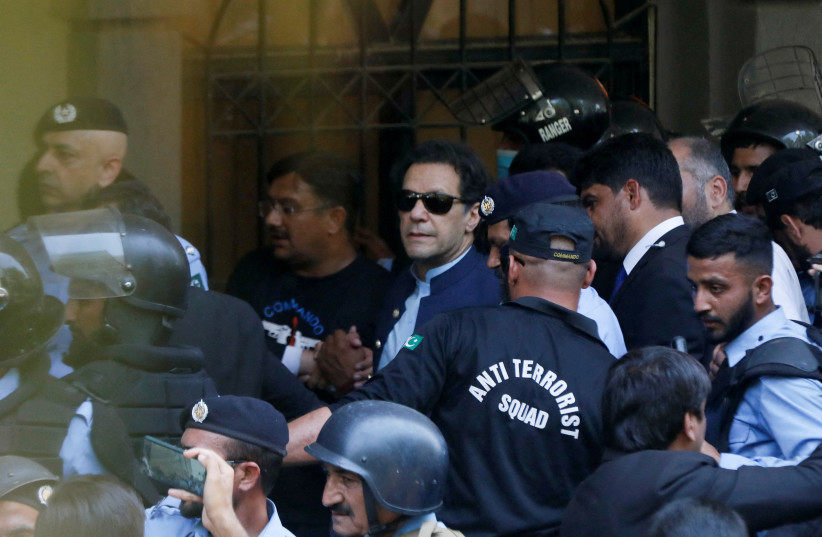Pakistan’s former prime minister, Imran Khan, along with his close aide, Shah Mehmood Qureshi, have each been sentenced to 10 years in prison in what is known as the cipher case.
For more stories from The Media Line go to themedialine.org
After a special court found them guilty of leaking state secrets, the short verbal decision was announced on Tuesday by Judge Abu Hasnat Zulqarnain at the Adiala jail in Rawalpindi.
The 71-year-old Khan, a legendary cricketer turned politician, and his former foreign minister, Qureshi, faced the high-profile case for allegedly retaining and communicating a classified diplomatic cable or cipher.
The cipher case centered on an alleged diplomatic exchange between Washington and Islamabad that Khan claimed was evidence of US involvement in a plot to depose him from the office of prime minister after he lost a vote of no confidence in Parliament in April 2022.

Imran Khan's ousting, subsequent protests
That April, Khan waved a letter during a public rally in Islamabad, claiming it was a cipher from the US calling for the end to his government. Khan claimed that this cable, which he made public, existed as proof that he was removed from power as part of a US-led conspiracy backed by Pakistan’s powerful establishment and corrupt politicians.
Khan and Qureshi were charged on Oct. 23, 2023, with using the cable for political gain and violating official secrets. They both pleaded not guilty.
US officials have repeatedly denied Khan’s accusations.
Meanwhile, Khan's Pakistan Tehreek-e-Insaf party (PTI) officially rejected the trial court's decision and termed the sentences handed down to their chairman and vice chairman as “illegal” and “cruel.”
In a press release, PTI announced that an instant appeal would be filed against the trial court's ruling.
“Both leaders are being persecuted to seek political revenge. We strongly condemn the judicial proceedings in defiance of the constitution and the cruel punishments handed down to the innocent leaders of the people,” the statement further added.
PTI also claimed that “after destroying the constitution and fundamental rights, elements terrified of Imran Khan’s immense popularity have brought the entire legal system of the nation to ruin.”
Khan's sister, Aleema Khan, asserted that “Imran Khan's death sentence had been requested by the public prosecutor.”
Speaking to the journalists outside the Adiala jail on Tuesday, Aleema added that “Imran Khan nominated US Ambassador Donald Liu and former Army Chief General Bajwa for cross-examination during the hearing, but it was not possible.”
She also alleged that “in addition to acting aggressively toward us today, the special court judge ejected our attorneys from the courtroom.”
Asad Qaiser, the former speaker of the National Assembly told The Media Line that “this is a contentious and skewed decision. We'll pursue a legal contest to this ruling.”
“This move aims to incite annoyance and agitation among the party workers. We will use our voting power on February 8 to exact retribution for this wickedness, so we won't be upset or disappointed,” Qaiser added.
He further claimed that “the previous coalition government had always termed the cipher as Imran Khan’s drama, so it is clear that case and the trial was also a drama, which was made solely to punish Khan and Qureshi.”
Both men have been sentenced to prison terms ahead of Pakistan's upcoming general elections on Feb. 8. Consequently, the PTI party is facing significant setbacks, including the prohibition of rallies, the removal of its party emblem, and the rejection of scores of its candidates to run in the election.
Speaking to The Media Line, Raja Tanveer Akhter, a veteran law practitioner at the Supreme Court of Pakistan, expressed his disagreement about the special court decision. “It was a disgraceful anti-justice trial. The way the case hearing was handled, especially over the last four days, completely violated the core principles of justice. In this instance, the law and justice have been overthrown,” he said.
“By stifling all of the demands for justice, this decision was made in a very hurried manner,” Akhter continued, saying that “the court declined to call the witnesses that the accused had chosen. The accused themselves did not acknowledge the state councils that the government had appointed.”
According to Akhter, “The judgment of the special court is not a surprising matter. Even the common man knew that Imran Khan would be punished regardless of the case due to the ridiculous way it was handled in court.”
He noted that “the events of 1977, appear to be repeating themselves when a military dictator General Zia-ul-Haq executed a popular leader Zulfikar Ali Bhutto, despite his innocence.”
Urging Pakistan’s apex judiciary to take notice of the court decision, he argued that the trial court's ruling “is embarrassing the Pakistani judiciary globally.”
Explaining that the accused has the legal right to appeal the sentence, Akhtar asserted that Khan's legal team will appeal on Wednesday before the Superior Court.
Adeeb Uz Zaman Safvi, a Karachi-based retired Pakistan Navy captain and a prominent security and political analyst, told The Media Line that “it is evident that case has not been processed by the rule law, violating the constitutional rights of the defenders.”
Safvi claimed that “as Khan and Qureshi were indicted under the 1923 official Secret Act, I firmly believe that as a prime minister, Imran Khan never violated the Secret Act.”
According to Safvi, “The cipher case was based on assumptions. I firmly believe that all of this is being done to propagate chaos throughout the country and call off the general elections.”
Safvi argued that “history will recall one thing, Khan was removed because of his integrity, having stood up against the corrupt but powerful mafias, not because he was corrupt, laundered money, or betrayed the nation.”
